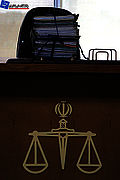The Security Office of the Judiciary Will be Reinstated
» In the Conflict Between the Administration and Judiciary
Despite the proliferation of intelligence and security agencies in Iran including the Intelligence Ministry and the various offices of intelligence and security forces within the Revolutionary Guards (IRGC), the army, the police, as well as the intelligence and security office of the judiciary branch of government, the head of Iran’s judiciary Sadegh Larijani complained of “not receiving sufficient assistance from security agencies” and pleaded for the “reinstatement and reactivation of the security and intelligence unit” of the judiciary.
Speaking at a gathering yesterday in the presence of managers of security/intelligence units of the judiciary, ayatollah Shahroodi said, “One of the achievements of the previous judiciary administration was the establishment of the security and intelligence office which performs a critical role in maintaining the independence of the judiciary system and protects it from possible interference by various organizations and offices.”
Referring to “the legal status of judiciary’s security and intelligence office”, Sadegh Larijani added, “According to the article 158 of the constitution, creation of judiciary establishments in concordance with the goals stated in the article 156 is the responsibility of the head of the judiciary; clearly articulated in the same article is the mandate of the head of the judiciary to develop organizational structures adequate for detection and prevention of crimes.” Without mentioning the opposing views in this regard, he said, “This is a wrong interpretation that the head of the judiciary is required to submit proposals to the government or the parliament in order to create the needed establishments within the judiciary administration. For the article 157 has stated all the conditions requiring the submission of judiciary proposals to the government and the parliament, and there would be pointless to have a separate article giving permission to the head of the judiciary to create new offices; to create here has a clear meaning”.
Such an office already exists within the judiciary organizational structure though with a “supervisory mandate”. Rather, Larijani’s argument points to his desire to re-define the activities of this office towards “an operational approach”.
In a different part of his speech, the head of the judiciary by mentioning that “in some cases the security and intelligence organizations do not help the judiciary system” emphasized, “ meanwhile the judiciary cannot stay idle and has to proceed with its legal mandate”. Having previously criticized “the interference of some security organizations”, Larijani clarified, “Unfortunately, whenever we are dealing with important investigations, such political oppositions are raised in order for the judiciary to change its pursuit of truth but they should all know that we are persistent in this path”. Though he did not mention any specific case but most likely he was referring to the first vice president, Mohammad Reza Rahimi, who has been accused of financial corruption by the judiciary and some members of the parliament.


